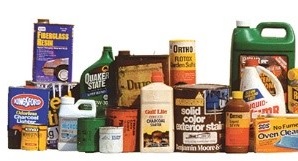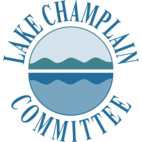Clean Lake Tip – Handling Household Hazardous Waste

Common household products that contain hazardous ingredients. Photo courtesy of the VT Dept. of Environmental Conservation.
If you look at items kept in basements, under sinks, and in the dark recesses of the garage, the odds are good that some of them contain harmful ingredients. How do you know if they’re hazardous? Words and symbols for “Warning,” “Danger,” and “Caution” are often readily visible. Household items that are corrosive, ignitable, poisonous, reactive, or toxic are known as Household Hazardous Waste (HHW). Examples include:
- Automobile batteries
- Compressed gas tanks (such as propane and oxygen)
- Drain openers
- Fluorescent lightbulbs
- Herbicides
- Household cleaners
- Motor oil
- Paint
- Pesticides
- Solvents
It’s important to not dispose of products containing hazardous ingredients in regular household trash. The easiest way to tackle hazardous waste is to educate yourself about which products in your home or workplace are unsafe. Here is a partial list of common household hazardous waste products. When possible, avoid using hazardous materials from the get-go. Read LCC’s Clean Lake Tip: Good Chemistry—Cleaning Up with Non-Toxic Cleaners for alternatives to commercial cleaning products.
Both New York and Vermont environmental agencies take comprehensive approaches to hazardous waste management. Learn about New York’s program here. The Vermont Department of Environmental Conservation (VT DEC) offers helpful resources on how to 1) handle household hazardous waste in your home; 2) transport household hazardous waste to collection events and locations; 3) approach hazardous waste if you’re a business.
Contact your waste district or town for information about how hazardous materials are locally managed. The Chittenden Solid Waste District has several short and helpful videos about hazardous waste disposal:
Whether getting a jumpstart on your spring cleaning routine or making the disposal of hazardous waste a new or more frequent practice, your actions will have a positive impact on the health of your community and local waterbodies. Thank you!
